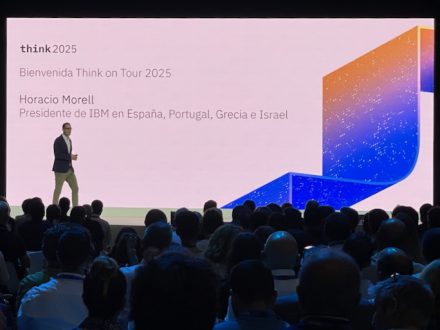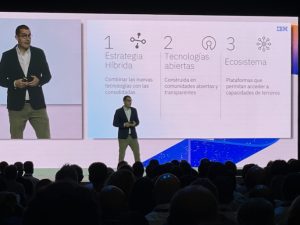IBM Think on Tour Madrid 2025 Anticipates the Imminent Quantum Revolution and AI-driven Business Transformation

IBM Think Tour Madrid 2025 analyses the impact of AI, intelligent agents and quantum computing on business strategy and competitiveness.
IBM held Think on Tour Madrid 2025, a key event designed for C-level executives to explore the latest developments in artificial intelligence, AI agents and quantum computing. The main objective of the initiative is to help companies make strategic decisions by addressing the challenges and opportunities in an ever-evolving technological landscape. The event, which took place in Madrid, featured an intensive agenda addressing the application of these disruptive technologies in the business world.
IBM Think on Tour Madrid 2025
The welcome session was attended by Horacio Morell, President of IBM in Spain, Portugal, Greece and Israel, who highlighted the company’s track record and vision for the future in a context of unprecedented technological change. With 99 years of presence in Spain and about to celebrate its centenary, IBM has demonstrated constant evolution and a firm commitment to supporting the country, its companies and governments in their transformation processes.
Three computing paradigms
Morell also emphasised that we are living in a historic moment where three computing paradigms coexist for the first time: classical computing, artificial intelligence (AI) and quantum computing:
- Classical computing: IBM has been instrumental in milestones such as the first mainframes in the 1960s, PCs, the Internet, the cloud, and the creation of the National Supercomputing Centre (BSC), a key asset for the country.
- Artificial intelligence: IBM has been working on AI for decades, with a growing impact. Watson’s learning of Spanish with Caixabank and collaborations with Santander, Mapfre and Telefónica were highlighted. AI is also transforming public administration, with projects for the Tax Agency, the Ministry of Defence, the Navy, the Government (optimising BSC models) and autonomous communities such as Catalonia, Andalusia and Extremadura, improving citizen service and efficiency. AI is a productivity tool for our generation, but 99% of corporate data has not yet been touched by AI.
- Quantum computing: From science fiction to reality, IBM has promoted the creation of an open ecosystem in the Basque Country, led by the Basque Government. As a first, a public-private partnership between the Basque Government and Iberdrola was announced, with more players joining. The physical opening of the sixth quantum computing centre in San Sebastián after the summer will house the world’s most powerful IBM machine.
The president of IBM Spain highlighted the accelerated speed of technological innovation, exemplified by the adoption of generative AI in business strategies in just two years. When asked how to deal with this dizzying pace, Morell shared three key principles that IBM applies:
- Merge new and old technologies: Unleash the transformative potential of new technologies with the reliability and security of established ones. One example is intelligent agents, which go beyond answering questions to automatically planning and executing processes. However, given that generative AI systems are probabilistic and can fail, IBM advocates a hybrid strategy. This combines the agility of agents with the reliability of deterministic processes to ensure error-free critical tasks. The importance of ‘guardrails’ (control mechanisms) and IBM’s Watsonx platform, which allows you to create and use your own or pre-built agents, was highlighted.
- Adopt an open strategy: The future of technology is open, allowing communities to leverage innovation and adopt new developments more effectively and quickly. IBM’s Granite models and the Watsonx platform are based on open source projects, which, for example, allow working with different types of GPUs and optimising AI inference.
- Work in open ecosystems: Morell emphasised that no company can meet all of a customer’s needs on its own, especially in this era of technological acceleration. It is about joining forces and working in ecosystems, as seen in the Basque Country’s quantum initiative or the agent platform that integrates solutions from IBM and third parties such as SAP or Salesforce.

Quantum computing in 2029: the next wave of innovation
In a bold prediction, Horacio Morell has stated that the next big wave of innovation will arrive in 2029 with quantum computing. IBM has announced an error-correcting quantum computer for 2029, representing a crucial breakthrough.
Currently, quantum computers can execute thousands of instructions. By 2026, they are expected to achieve ‘quantum advantage,’ solving business problems that classical computers cannot. The development of an algorithm to correct errors means that building fault-tolerant quantum computers is no longer a scientific problem, but one of execution and engineering.
This will enable the resolution of currently intractable problems, such as the optimisation of bank portfolios, complex logistics routes or advanced mathematical problems, heralding a new industrial revolution.
IBM’s ambition is for Europe’s first fault-tolerant quantum computer to be in Spain by 2029. Morell sees this as a unique opportunity for the country to lead this disruptive technology, reinforcing IBM’s commitment to placing Spain at the forefront of technology.
Other presentations at the event
A key segment focused on ‘Unlocking the full value of enterprise artificial intelligence’, with presentations by Ana Paula Assis, Senior Vice President and Chair EMEA and Growth Markets at IBM, and Rebeca Vázquez, General Manager of HashiCorp’s Centres of Excellence.
‘Artificial Intelligence as a driver of comprehensive transformation’ was explored by Carlos Vecino, General Director of Marketing at Naturgy, Ana Gobernado, Managing Partner at IBM Consulting Spain, Portugal, Greece and Israel, and Javier Olaizola, Global Managing Partner Hybrid Cloud and Data at IBM Consulting. This session focused on how AI can provide lasting competitive advantages.
The evolution towards a new era of work was the focus of the session on ‘AI agents designed for business’. It featured the participation of Sergio Merchán, Global CIO at Iberdrola, Myriam Blázquez, Managing Director at Experis, ManpowerGroup, and Jacobo Garnacho, Director of AI and Data Business at IBM.
‘Artificial Intelligence and Automation in a Hybrid World’ was presented as a necessary urgency, with the participation of Gustavo Rodríguez de la Fuente, Global Director of Security Architecture at BBVA; Javier Roncero, Director of Automation Solutions at IBM; José Miguel Indave, Technical Director of webMethods & Streamsets at IBM; and Sergio Hernández, Enterprise Account Manager for Spain and Portugal at HashiCorp.
The future of technology was addressed in the session ‘What will computing be like in the future?’, which included Juan Ignacio Pérez Iglesias, Minister of Science, Universities and Innovation of the Basque Government; Silvia Núñez Rivero, Head of Digital Transformation at Iberdrola Spain; Sriram Raghavan, Vice President of IBM Research AI; and Mikel Díez, Director of Quantum Business Development at IBM Research.
The agenda also included a networking space and practical demonstrations at the ‘Coffee and Think Forum visit’ and a ‘Cocktail and Think Forum visit’ after the conclusions and closing of the event.
Think on Tour Madrid 2025 was an essential meeting point for C-level business leaders and technology experts interested in the profound transformations that AI and quantum computing are driving in the business world.